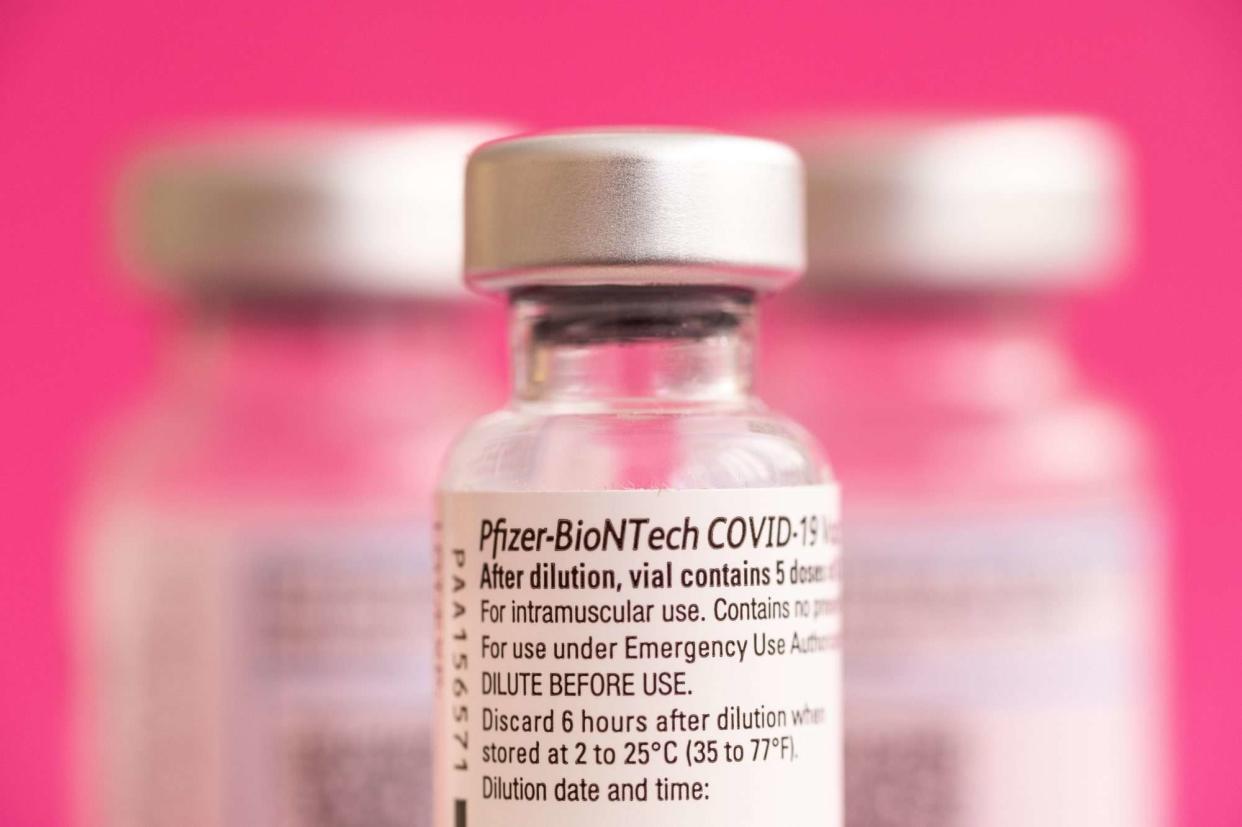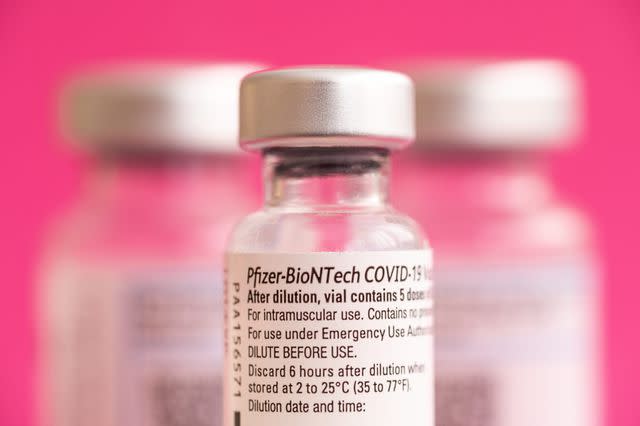Breast Cancer and the COVID-19 Vaccine: Is It Safe?

Medically reviewed by Geetika Gupta, MD
Coronavirus disease 2019 (COVID-19) is a contagious illness caused by the SARS-CoV-2 virus. In most cases, people with COVID-19 experience symptoms like coughing and fever. People with certain medical conditions, such as breast cancer, may face a higher risk of serious and life-threatening complications from COVID-19.
The COVID-19 vaccines are safe and effective for people with breast cancer. Getting vaccinated can help to prevent harmful outcomes from the illness. Learn more about breast cancer and the COVID-19 vaccine, including safety, benefits, side effects, and more.

Is the COVID-19 Vaccine Safe and Effective for People With Breast Cancer?
Most people ages 6 months and older should get the COVID-19 vaccine. COVID vaccines effectively prevent COVID-19 and related complications, including hospitalization and death.
In the United States, all vaccines undergo thorough and rigorous testing to ensure they are safe and effective before being authorized. Severe adverse reactions to the COVID-19 vaccine are infrequent.
It’s safe for most people with breast cancer to get the COVID-19 vaccine. However, certain cancer treatments can make the COVID-19 vaccine less effective. If you are undergoing or about to undergo breast cancer treatment—such as allergy shots (immunotherapy), chemotherapy, or radiation therapy—talk to your healthcare provider before getting the COVID vaccine. Your doctor might suggest that you get the vaccines on an alternative schedule.
Some people experience axillary adenopathy—swollen lymph nodes in the armpits—after taking the COVID-19 vaccine. Usually, the lymph node will shrink down on its own in a few days or weeks. This potential side effect concerns some people with breast cancer or a history of breast cancer.
However, recent research suggests that there’s no reason to delay a mammogram, breast cancer screening, or breast cancer treatment after receiving a COVID-19 vaccine. If you have breast cancer and are concerned about axillary adenopathy, talk to your healthcare provider about getting the vaccine in the opposite/unaffected arm.
How Common Is Breast Cancer?
Breast cancer is one of the most common kinds of cancer among women in the United States. About one in eight people in the U.S. will develop breast cancer at some point during their lifetime.
Which Type of COVID-19 Vaccine Should People With Breast Cancer Get?
The three COVID-19 vaccines currently authorized or approved for use in the U.S. by the Food and Drug Administration (FDA) include:
Pfizer-BioNTech and Moderna, both of which work to “teach” your immune system how to fight off COVID-19 through messenger RNA (mRNA) technology.
Novavax, a protein subunit vaccine that contains pieces (the “spike protein”) of the SARS-CoV-2 virus.
It’s safe for people with breast cancer to get any of the above COVID-19 vaccines. However, people with cancer should usually avoid live virus vaccines. None of the COVID-19 vaccines currently authorized for use in the U.S. are live virus vaccines, so they are all safe for most people with breast cancer.
Are There Any Side Effects of Taking the COVID-19 Vaccine?
Most side effects of the COVID-19 vaccine are mild to moderate. Common side effects of the COVID-19 vaccine include:
Swelling, soreness, and redness at the injection site
Fatigue
Headache
Fever
Chills
Muscle pain
Nausea and vomiting
Usually, COVID-19 vaccine side effects go away on their own after several days. You can relieve pain and swelling by taking over-the-counter (OTC) medications, such as ibuprofen, and applying a cool, damp washcloth to the swollen area. It’s also important to stay hydrated and get plenty of rest.
Allergic Reactions to the COVID-19 Vaccine
Signs of an allergic reaction to the COVID-19 vaccine may include:
Difficulty breathing
Swelling in the mouth, tongue, face, lips, or throat
Low blood pressure
Skin reactions, such as a rash or hives
Allergic reactions to vaccines, including the COVID-19 vaccine, are extremely rare. If you experience any signs of an allergic reaction shortly after taking the COVID vaccine, seek emergency medical help right away.
Risks of COVID-19 for People With Breast Cancer
People with breast cancer and people who have had breast cancer in the past may have a higher chance of developing severe COVID-19 complications. People with weakened immune systems are more likely to be hospitalized from the virus and to have long-lasting illnesses. Cancer survivors who are taking immunosuppressants have an especially high risk of severe illness.
Both cancer and cancer treatments, such as chemotherapy, can affect your body’s ability to prevent and fight off infection. Immunotherapy, which in rare cases treats certain types of breast cancer, can increase your risk of COVID-19 complications by negatively affecting the lungs.
Older people with cancer and people with comorbid health conditions—such as heart disease and problems with the lungs—are particularly at risk of dying from COVID-19.
What Should People Avoid Before Taking the COVID-19 Vaccine?
Some people want to take OTC medications, such as Tylenol (acetaminophen) and ibuprofen, before taking the COVID-19 vaccine. However, it’s best to avoid OTC pain relievers just before you get the shot to avoid affecting how the vaccine works.
Let your healthcare provider know about any prescribed medications you’re taking—for breast cancer management or anything else—before getting the COVID vaccine. Don’t stop taking any of your medications before getting the shot unless your doctor recommends that you do so.
Where Does the COVID-19 Vaccine Come From?
Researchers used information about previous similar viruses, such as Middle East respiratory syndrome (MERS) and severe acute respiratory syndrome (SARS), to develop the COVID-19 vaccines.
All FDA-authorized and FDA-approved COVID-19 vaccines were developed in laboratories. Then, they went through three phases of clinical trials with tens of thousands of participants to test for safety and effectiveness. After the trials, volunteers were monitored for eight weeks to check for potential adverse reactions. The COVID-19 vaccine was found to be safe and effective in protecting against COVID-19 for most people, with few people reporting serious reactions to the shot.
Where Can You Get the COVID-19 Vaccine?
There are free and low-cost COVID-19 vaccines available at a wide range of locations, such as doctor’s offices, hospitals, urgent care centers, vaccination clinics, pharmacies, health departments, workplaces, and schools. Talk to your healthcare provider or get in touch with your state health department if you aren’t sure where to find a COVID-19 vaccine.
You can also search for COVID-19 vaccines in your area at Vaccines.gov, call the Centers for Disease Control and Prevention hotline at 1-800-232-0233 (TTY 1-888-720-7489), or text your ZIP code to 438829.
When Should You Take the COVID-19 Vaccine?
For most people, you are considered up-to-date with your vaccination if you have received one dose of and updated, bivalent vaccine from Pfizer or Moderna. Adults over 65 and younger children may receive additional doses.
The Novavax vaccine is an alternative to the mRNA vaccines, but is available only in limited situations.
People with weakened immune systems—such as people who are currently undergoing breast cancer treatment—should talk to their healthcare provider about an alternative vaccine schedule to ensure they are protected against COVID-19. If you have breast cancer or another condition that weakens your immune system, you may be recommended additional vaccine doses.
Summary
People with breast cancer have a higher risk of serious medical complications, hospitalization, and even death from COVID-19. The COVID-19 vaccines offer effective protection against COVID-19 and related complications, and they are safe for people with breast cancer. Side effects of the COVID-19 vaccine are usually mild and resolve on their own.
It is recommended that all people over six months old receive a COVID-19 vaccine. People who are undergoing breast cancer treatment, such as chemotherapy or radiation therapy, should let their healthcare provider know before getting the vaccine. They may recommend an additional bivalent dose or an alternative vaccine schedule.
A Word From Verywell
It’s safe and important for people with breast cancer to get the COVID-19 vaccine. Talk to your healthcare provider if you have concerns about potential side effects or adverse reactions.
Frequently Asked Questions
Should breast cancer survivors get the COVID vaccine?
Yes, some survivors should get the COVID vaccine in the arm opposite where they had breast cancer. If you’ve had breast cancer in the past, it’s important to talk to your healthcare provider about the best location for injection.
Does COVID-19 increase cancer risk?
There is some evidence that COVID-19 may cause long-lasting issues like chronic inflammation and tissue damage. Some researchers believe that this may increase the long-term risk of developing certain cancers. However, it’s still unclear whether or not COVID-19 and cancer are linked.
Can I get the COVID vaccine while breastfeeding?
The CDC recommends that people who are breastfeeding take the COVID-19 vaccine, including any recommended extra shots. Studies have shown that the COVID-19 vaccine is safe and effective in people who are pregnant, planning to get pregnant, or breastfeeding. If you’re currently breastfeeding, the mRNA vaccines may also pass antibodies on to your baby and protect them against COVID-19.

